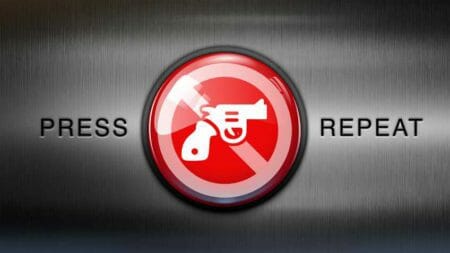By Roger J. Katz, Attorney at Law and Stephen L. D’Andrilli


New York, NY -(Ammoland.com)- Realizing the futility of articulating any standard of review for testing the constitutionality of government action that attacks the very core–the very essence–of a fundamental right, the Heller majority realized the need to dispense with all traditional standards of review and all hybrid versions of conventional standards of review in those instances where governmental action—in the Heller case, a total ban on firearms that the public traditionally and commonly uses for self-defense, namely firearms categorized as handguns, be those handguns semiautomatic pistols or single or double action revolvers—attacks the very essence, or core of the right.
Justice Breyer, himself, who wrote a dissenting opinion in Heller, realized the conundrum posed in the application of traditional standards of review for testing the constitutionality of government action that is directed to the core of a fundamental right.
The dissenting Justice, Stephen Breyer, did realize, perceptively, that application of even a stringent standard, strict scrutiny—no less than application of the most relaxed standard of review, rational basis—would not be a fair standard for a Court to employ to test the lawfulness of a governmental action that is directed to the core of a fundamental right because Courts could still come to the wrong conclusion and effectively destroy a fundamental right. Breyer therefore thought that his novel interest-balancing inquiry would overcome problems associated with conventional standards of review.
In support of use of his novel interest-balancing inquiry to test the constitutionality of the District of Columbia’s absolute prohibition on possession of handguns in the District, Justice Breyer said this (and we quote Justice Breyer, at length):
“In weighing needs and burdens [utilizing my interest-balancing standard to test the constitutionality of the District of Columbia’s absolute prohibition on possession of handguns in the District] we must take account of the possibility that there are reasonable, but less restrictive, alternatives. Are there other potential measures that might similarly promote the same goals while imposing lesser restrictions [Citation Omitted]? Here I see none.
The reason there is no clearly superior, less restrictive alternative to the District’s handgun ban is that the ban’s very objective is to reduce significantly the number of handguns in the District, say, for example, by allowing a law enforcement officer immediately to assume that any handgun he sees is an illegal handgun. And there is no plausible way to achieve that objective other than to ban the guns.
It does not help respondent’s [D.C. Government’s] case to describe the District’s objective more generally as an “effort to diminish the dangers associated with guns.” That is because the very attributes that make handguns particularly useful for self-defense are also what make them particularly dangerous. That they are easy to hold and control means that they are easier for children to use [Citation omitted]. That they are maneuverable and permit a free hand likely contributes to the fact that they are by far the firearm of choice for crimes such as rape and robbery [Citations omitted].
This symmetry suggests that any measure less restrictive in respect to the use of handguns for self-defense will, to that same extent, prove less effective in preventing the use of handguns for illicit purposes. If a resident has a handgun in the home that he can use for self-defense, then he has a handgun in the home that he can use to commit suicide or engage in acts of domestic violence [Citations omitted]. If it is indeed the case, as the District believes, that the number of guns contributes to the number of gun-related crimes, accidents, and deaths, then, although there may be less restrictive, less effective substitutes for an outright ban, there is no less restrictive equivalent of an outright ban.”
Justice Breyer concludes that no less restrictive means exists to promote the goal of promoting public safety than the District of Columbia’s total ban on handguns promotes and that, under the strict scrutiny standard, a total ban on handguns would therefore pass judicial scrutiny and therefore be found constitutional even though the Second Amendment right of the people to keep and bear arms is clearly burdened. As he says:
“The upshot is that the District’s objectives are compelling; its predictive judgments as to its law’s tendency to achieve those objectives are adequately supported; the law does impose a burden upon any self-defense interest that the Amendment seeks to secure; and there is no clear less restrictive alternative. I turn now to the final portion of the ‘permissible regulation’ question: Does the District’s law disproportionately burden Amendment-protected interests? Several considerations, taken together, convince me that it does not.”
So, is that the end of the inquiry? Does Justice Breyer assert that the D.C. handgun ban is constitutional even though a total ban on possession of handguns clearly burdens, and in a substantial way, the American citizen’s exercise of his or her fundamental right?
No. Justice Breyer says, that application of his standard is superior to that of application of even a stringent standard like strict scrutiny, for there is a second part to Justice Breyer’s test, even though he has already inferred that the burden on those who seek to exercise their Second Amendment right is substantial.” Justice Breyer goes on to say (and once again we quote Justice Breyer at length):
“First, the District law is tailored to the life-threatening problems it attempts to address. The law concerns one class of weapons, handguns, leaving residents free to possess shotguns and rifles, along with ammunition. The area that falls within its scope is totally urban [Citation omitted]. That urban area suffers from a serious handgun-fatality problem. The District’s law directly aims at that compelling problem. And there is no less restrictive way to achieve the problem-related benefits that it seeks.”
“Second, the self-defense interest in maintaining loaded handguns in the home to shoot intruders is not the primary interest, but at most a subsidiary interest, that the Second Amendment seeks to serve. The Second Amendment’s language, while speaking of a ‘Militia,’ says nothing of ‘self-defense.’ As Justice Stevens points out, the Second Amendment;s drafting history shows that the language reflects the Framers’ primary, if not exclusive, objective [Citation omitted]. And the majority itself says that ‘the threat that the new Federal Government would destroy the citizens’ militia by taking away their arms was the reason that right . . . was codified in a written Constitution’ [Citation omitted]. The way in which the Amendment’s operative clause seeks to promote that interest–by protecting a right ‘to keep and bear Arms’ may in fact help further an interest in self-defense. But a factual connection falls far short of a primary objective. The Amendment itself tells us that militia preservation was first and foremost in the Framers’ minds. See Miller, 307 U.S., at 178, 59 S. Ct. 816, 83 L. Ed. 1206 (‘With obvious purpose to assure the continuation and render possible the effectiveness of [militia] forces the declaration and guarantee of the Second Amendment were made,’ and the Amendment ‘must be interpreted and applied with that end in view’).”
“Further, any self-defense interest at the time of the framing could not have focused exclusively upon urban-crime-related dangers. Two hundred years ago, most Americans, many living on the frontier, would likely have thought of self-defense primarily in terms of outbreaks of fighting with Indian tribes, rebellions such as Shays’ Rebellion, marauders, and crime-related dangers to travelers on the roads, on footpaths, or along waterways [Citation omitted]. Insofar as the Framers focused at all on the tiny fraction of the population living in large cities, they would have been aware that these city dwellers were subject to firearm restrictions that their rural counterparts were not [Citation omitted]. They were likely then to have thought of a right to keep loaded handguns in homes to confront intruders in urban settings as central. And the subsequent development of modern urban police departments, by diminishing the need to keep loaded guns nearby in case of intruders, would have moved any such right even further away from the heart of the Amendment’s more basic protective ends [Citation omitted].”
“Nor, for that matter, am I aware of any evidence that handguns in particular were central to the Framers’ conception of the Second Amendment. The lists of militia-related weapons in the late-18th-century state statutes appear primarily to refer to other sorts of weapons, muskets in particular.”

Justice Breyer continues with his polemic, adding: “Regardless, why would the [Heller] majority require a precise colonial regulatory analogue in order to save a modern gun regulation from constitutional challenge?” The answer to Justice Breyer’s question should be obvious to anyone who recognizes the importance of the Second Amendment–as much now, in the present, as then, in the past. The Heller majority felt compelled to respond to anti-gun critics, including, most notably, those who, like Justice Breyer and Justice Stevens, curiously enough, have, in extrajudicial commentary and publications, made clear their desire to interpose foreign laws and foreign jurisprudential values–alien to our unique history, our unique laws, and our unique Constitution–into their own methodological approach to U.S. Supreme Court case analysis and decision-making. Since the laws of Countries such as Great Britain and Australia, for example, have nothing even remotely analogous to our Second Amendment, one should reasonably conclude that anything set forth in the laws and jurisprudence of those Nations would be legally irrelevant to and certainly impossible to reconcile with our own system of laws and jurisprudence should anyone wish to insinuate such laws and jurisprudence into our case law anyway.
Justice Breyer concludes his polemic, by asserting essentially the argument we hear ad nauseum from anti-gun groups. It is this: Americans should leave to “democratically elected officials” of government the power to impose government’s will on the rest of us because government knows what’s best for all of us, even unto the veritable destruction of our fundamental rights and liberties. Justice Breyer asserts,
“‘As important, the majority’s decision threatens severely to limit the ability of more knowledgeable, democratically elected officials to deal with gun-related problems. The majority says that it leaves the District ‘a variety of tools for combating’ such problems [Citation omitted]. It fails to list even one seemingly adequate replacement for the law it strikes down. I can understand how reasonable individuals can disagree about the merits of strict gun control as a crime-control measure, even in a totally urbanized area. But I cannot understand how one can take from the elected branches of government the right to decide whether to insist upon a handgun-free urban populace in a city now facing a serious crime problem and which, in the future, could well face environmental or other emergencies that threaten the breakdown of law and order.”
So it is that Justice Breyer would apply his novel “interest-balancing” inquiry to test the lawfulness, the very constitutionality, of Maryland’s Firearm Safety Act, fully believing in and having complete faith in the usefulness of his novel standard for application to governmental actions that attack the core of the Second Amendment. Having, then, utilized his interest-balancing inquiry standard, he seems oblivious to the fact that, even with his preferred new test, no less than with any of the other conventional standards, he, along with anyone else who might be tempted to use his novel approach, would not be prevented from automatically ordaining the result wanted–which means that, notwithstanding Justice Breyer’s conviction that his novel test would preclude a foreordained conclusion, a Court that finds the Second Amendment repugnant will still come to the conclusion desired: a finding that governmental action that effectively bans the lawful possession of an entire category of firearms and that negatively impacts the core of the Second Amendment is lawful when, in fact, it isn’t. Indeed, one finds that Justice Breyer was not immune to the fatal flaw that can and often is the bane of all otherwise brilliant Jurists.
We find that the fatal flaw that exists is found to reside less in a presumed fault with any conventional or fanciful approach used by a Jurist to test the constitutionality of a governmental action than in the depth of the Jurist’s very being. That is to say, the fault, we see, rests, first and foremost, in the Jurist’s heart, not in the Jurist’s analytical and intellectual acumen. The late Justice Scalia recognized this, which is why he felt it necessary to discard any Judge-made test that might be applied to governmental actions that target the core of a fundamental right. Sadly, Justice Breyer did not see this, even when Justice Scalia pointed out the fatal flaw, which he, tactfully ascribed to Justice Breyer’s interest-balancing inquiry, rather than to Justice Breyer, himself.
Interest-balancing, predicated on social and political policy objectives, is as poor a standard for testing the constitutionality of laws infringing on the core of fundamental, natural rights, codified in our Bill of Rights, as is interest-balancing in the field of ethics and morality.
In asserting the deficiencies inherent in interest-balancing, for ascertaining the moral good of actions the great German Philosopher, Immanuel Kant, said this: “Woe unto him who searches in the winding paths of the theory of interest-balancing for some technique to uphold the debasing of human dignity.” “The Metaphysics of Morals 141 (Mary Gregor trans., 1991),” as cited in “Essay: In God’s Image: The Religious Imperative Of Equality Under Law,” 99 Colum. L. Rev. 1608, 1624 (October 1999).
We continue our analysis of the dangerous and horrible Kolbe decision in forthcoming articles.
About The Arbalest Quarrel:
Arbalest Group created `The Arbalest Quarrel’ website for a special purpose. That purpose is to educate the American public about recent Federal and State firearms control legislation. No other website, to our knowledge, provides as deep an analysis or as thorough an analysis. Arbalest Group offers this information free.
For more information, visit: www.arbalestquarrel.com.







I just don’t get the logic of why these liberal justices “to interpose foreign laws and foreign jurisprudential values–alien to our unique history, our unique laws, and our unique Constitution–into their own methodological approach to U.S. Supreme Court case analysis and decision-making. ”
The 9th circuit cited old English law hundreds ago in the Peruta case. This is just liberal judicial activism. Tyrants.
Not the dangers associated with guns, it is the danger associated with CRIMINALS who use guns.
The REAL problem IGNORED by all the Anti-gun Ownership morons in state, county and city governments is that they consistently FAIL to penalize criminals for their use of firearms in committing a crime of any degree or proportion. Want an example? GO take a look at HOW MANY crimes are committed using a forearm and in HOW FEW cases there is ANY penalty for having used that firearm; Also look at how soon these same criminals even when convicted of using the firearm are released BACK onto the public with parole and greatly shortened sentences. This is very evident in… Read more »
CG, is correct. Why are the various governments so good at regulating law abiding citizens, and yet so poor at regulating criminals?
Oh, I’m sorry I thought that was because of the 2A. What happened to “shall not be infringed” now? Those who aren’t penalizing a crook are following the 2A in the strictest sense.
@Gil, are you able to articulate your argument more clearly? What you have written is typically vague and uncertain.
Interesting comments too be sure…
Justice Breyer is certainly not a Kantian where everything devolves into either good or evil. I would also be willing to bet that he supports ex post facto law along the lines of a change in “status” in that the taking of a right is not an additional punishment. I am not a Lawyer, and I don’t play one on the TV but I sure as heck would think that at the SCOTUS level when their is a question involving a right that only strict scrutiny should always be used.
Interpreting “law” and “creating” law are polar opposites.
How difficult is it for a Justice to understand this simple”fact?”
Lifetime appointments means a comfy job forever. Ajob a person can do even if they are too feeble minded to get there and back home by themselves. This one and ginsburg both have outlived their sense of justice and reasoning. I suspect everything looks foggy to them. Term limits for all of government!
Methinks,
A Zebra Judge …. what colour is he ?
According to this Bubble headed booby (taken from Dr. smith’s famous Lost in Space lore) Americans cannot be entrusted to defend themselves with a gun, because we might be a criminal. Using this clown’s reasoning, none of us should be walking around free, because we might pose a threat, cause we might be a criminal. Basically, this Justice uses the Constitution as his favorite brand of tiolet paper.
Breyer is obviously not a constitutionalist and on that basis should never have been allowed on the court. It’s not that hard “shall not be infringed” means what it says. We have allowed the government to taken rights away through these corrupt judges. The government doesn’t give back what it takes it only takes more.
The Second Amendment is there to protect us from people that are only one and a half steps above that of Breyer, the man who would like to be, Tyrant. I got news for everyone reading these posts, The Founding Fathers would have deemed this Justice a Tyrant, given the differences in the realities of the past, where perceptions were much different. What passes for ideological disagreements today, would likely be viewed as treason two hundred years ago. The Founders did not play these PC mind games, and the illogic reasoning of this Judge even by modern standards is staggering.… Read more »
Then why aren’t you out there are arguing for the Peoples’ right to own heavy weaponry to repel a modern army? Gun ownership didn’t save the Waco mob. Imagine if they had a small nuke and threaten to detonate it if the Feds weren’t going to leave them alone? Somehow I believe the Feds would have second thoughts that day
“Opinions”, even those by the well educated and well meaning, are like……
you guys know the rest.
Gil the idiot probably goes into theaters to shout Fire for the fun of it.
Based on that logic, if you can call it that…… All judges, politicians and law enforcement should be deemed illegal. If, in their course of work, they have ever done harm on anyone, they have committed an illegal act and thus should be illegal. That is exactly what he is saying above. All the words and BS and it comes down to a very simple statement. (And some actual lies) If anything could ever harm someone, it should be illegal. Statement that is a lie: Second, the self-defense interest in maintaining loaded handguns in the home to shoot intruders is… Read more »
Correct, which is why the standard of strict scrutiny should always be applied.
@Al Friend, Yes, it is a clever ruse to call them primary and secondary interests when those interests are exactly equal. Breyer (it should by Brayer- one who brays like a donkey) does not trust his fellow Americans. He sees in the news the foolish actions of a few and projects it onto the majority of Americans, but, in truth, the vast majority make good choices every day. That makes him an elitist. If you trust your fellow Americans, generally and verify, then you have no problem with the Second Amendment. If you do not trust your fellow American, then… Read more »
Breyer’s assertions that there is no alternative is a false narrative. He lays no causation of violence in the hands of criminals, nor in the courts (plural, and at many levels) ineffective and even irresponsible dealings with those criminals.
Breyer just goes down a rabbit hole and uses his “novel” standard as a means to eliminate an Individual Right in the interests of the State. This standard unlike that of Strict Scrutiny can be easily applied to banning free speech, particularly “Dangerous Subjects” such as Books on how to make weapons or explosives to even Chemistry Books (knowledge of which can be used to make drugs or explosives).
In short: Breyer’s approach has NO LIMITS on how much a right can be infringed or even outright eliminated by the Courts.
What good is the 2A if you can’t shoot politicians, public officials and the general populace?
@Gil, Really? After reading the attached AQ article, all you can come up with is a shallow, non sequitur slogan. What did you think of Beyer’s dicta, and Scalia’s Kant based reply?
Wild Bill,
I’m surprised you took the Gil’s hook, line, and sinker.
It’s better to ignore him, them to regress to his level.
@Eric, Yes, it is better to ignore him, and deny him a little more VPC troll pay, but I don’t think that I descended to his level. Besides he invites push back. It would be rude not to accept!
True. You did not descend to his level. But he always causes many to divert away from the subject article.
What good is the First Amendment if bozos like you get to post bilge on the internet?
Like
You, Gil, are the example we use when we say that we defend the right of free speech to all, no matter how repugnant or ignorant it may be. As was said by a previous poster a few weeks ago, “Gil” is the new pseudonym of the guy who used to post all the time here. I forgot his name — that tends to happen with those whose irrelevant comments fade away like dust in the breeze. They change their names but they all have the same goal and, indeed, probably do work for the same organization. Their sole aim… Read more »
GIL, YOUR A IDIOT LIBTARD, pull your head out your ass, and go lick Clintons ass hole…….
There is an underlying truth in Gil’s statement, how be it not the “truth” that Gil meant by his trolling sarcasm. The main purpose of the 2A is to protect our individual access to and use of ARMS (all individual arms, not just firearms) so as to have a defense against a tyrannical government that has far exceeded the limits of the invasion upon our Rights. That includes politicians, public officials, and the general populace that supports such tyranny. ex.: https://constitution.org/mil/tn/batathen.htm Anyone, like Breyer, who attempts to use any doctrine of a “balancing standard” without first placing OUR RIGHT, “shall… Read more »
Judge Breyer’s commentary about modern police department’s capabilities reducing the need for handguns in the home shows just how detached from reality he is. Perhaps he should set down in a lounge and have a gentlemanly discussion with Chief Craig of Detroit and Sheriff David Clark of Milwaukee to get a clearer picture of the dangers of being unarmed in a cosmopolitan area. That is if he isn’t ideologically blinded by liberal dogma.